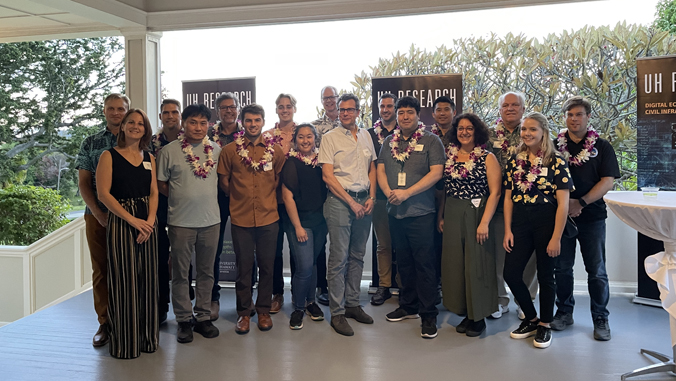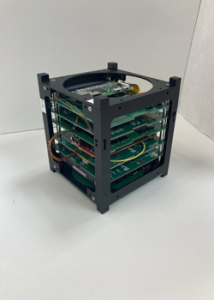
Five University of Hawaiʻi-affiliated technology startups have been selected for a UH innovation incubator, Hawaiʻi Technology Innovation Development Ecosystem (HITIDE). This novel 24-month entrepreneurial program offers up to $50,000 in seed funding, customized education, mentorship and resources tailored to the unique needs of academic entrepreneurs to help them translate and advance UH-developed, impact-driven technologies and solve real-world problems.
“We are extremely pleased to support this diverse group of startups that offer an exciting range and depth of innovative technologies developed through UH research,” said Vassilis L. Syrmos, UH vice president for research and innovation. “These technologies have the potential to significantly improve health care and training, space exploration and engineering design—and are prime examples of why it is so important that we support our researchers and create more entrepreneurial opportunities for them through novel programs like HITIDE.”
HITIDE’s cohort 2
Generative Design Software is an emerging, computer-aided artificial intelligence engineering technology and advanced algorithm developed by Marcelo Kobayashi, a mechanical engineering professor at UH Mānoa’s College of Engineering. With the capacity to intelligently pull various forms of data to improve engineering design, this technology can significantly reduce cost and the number of development cycles to prototyping in aerospace, automotive and building industries.
HI-Spectral is a groundbreaking snapshot hyperspectral imaging technology developed by Astronomer Haosheng Lin and Mechanical Engineer Morgan Bonnet at UH’s Institute for Astronomy. The technology has been used in astronomical observations and offers advanced characterization and identification of different substances in other applications including health, agriculture, Earth and environmental science.
Interstel Technologies offers a fully responsive mission operations system for robust, coordinated operation of satellites, UAVs and other vehicles in dynamic environments. Its iCOSMOS software was developed by the UH Mānoa Hawaiʻi Space Flight Laboratory (HSFL) Specialist and Project Manager Trevor Sorensen and his team: HSFL Lead Software Engineer Eric Pilger; HSFL Deputy Director and Systems Engineer Miguel Nunes; and Junior Software Engineer Lynzee Hoegger.

Mahina Aerospace includes a team from HSFL: Avionics Engineer and Program Manager Amber Imai-Hong; Assistant Researcher Frankie Zhu; Software Engineer Luke Clements; and Systems Integrator Chris Amendola. Their technology is a low-cost spaceflight-ready, educational, small 1U cube satellite. Paired with a collection of STEM curricula, the Artemis CubeSat has the potential to significantly advance aerospace education and provides a low-cost option for industries to send integrated payloads to space.
XRCore was developed by a team from the John A. Burns School of Medicine at UH Mānoa: Professor Scott Lozanoff; Technical Director of Anatomical Imaging Jesse Thompson; and Clinical Assistant Professor Thomas Noh. The company offers advanced image processing and 3D printing using artificial intelligence segmentation to enhance pre-surgical planning and clinical training for current and future clinicians.
“The majority of our cohort members and program candidates have full-time jobs and limited entrepreneurial experience, and they approach things from an academic versus business lens,” said George Yarbrough, HITIDE program lead and associate director, entrepreneurship programs for the UH Office of Innovation and Commercialization. “We are looking at the Hawaiʻi innovation pipeline and identifying how to strengthen the ecosystem by supporting academic entrepreneurs with developing their technologies into products and businesses that benefit our community and beyond. We hope that most of these early stage startups will go on and be accepted into other growth accelerators such as Elemental Excelerator.”
Virtual entrepreneurship program
Cohort members are currently participating in the regional National Science Foundation (NSF) I-Corps, a virtual entrepreneurship program that provides immersive and experiential training in how to test the market through customer discovery and create a business strategy to maximize innovation impact.
Following NSF I-Corps, cohort members will receive customized curriculum and training to: determine their technology’s product market fit; develop their startup business model and strategy; and pursue business development opportunities including fundraising, federal grants and customers.
Visit the HITIDE website for more information. UH will begin recruiting for cohort 3 starting this summer. Additional updates will be released on the HITIDE website, or email hitide@hawaii.edu with questions.

